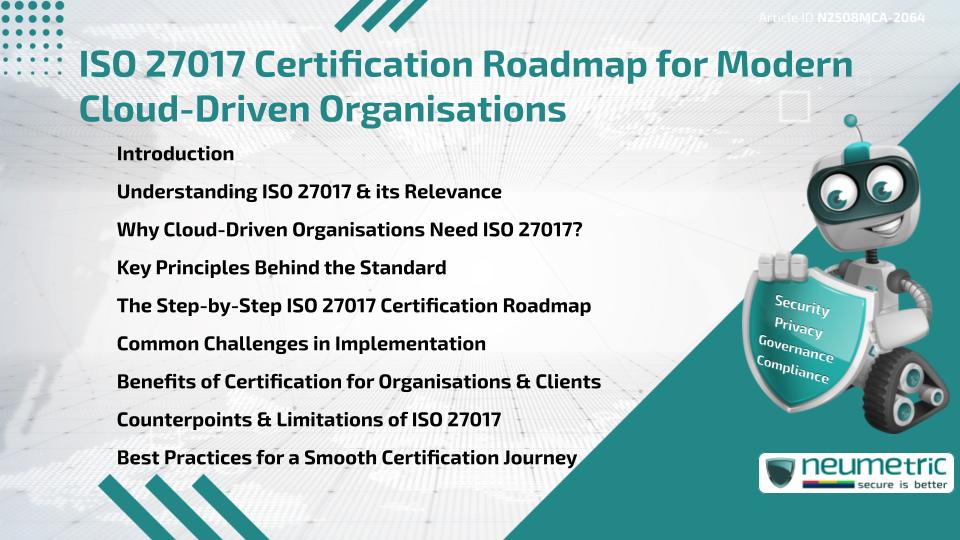Table of Contents
ToggleIntroduction
The ISO 27017 Certification roadmap is a structured guide that helps cloud-driven organisations align their security practices with Industry Standards. ISO 27017 provides guidelines for cloud-specific Security Controls, enhancing trust & compliance. This roadmap highlights why the Certification matters, how to achieve it, the common challenges involved & the benefits it delivers. It also considers counterpoints & limitations while offering Best Practices to ensure a smooth journey toward certification.
Understanding ISO 27017 & its Relevance
ISO 27017 is an international Standard that provides guidelines for Information Security Controls in cloud services. It extends the well-known ISO 27001 Standard by addressing cloud-specific Risks such as shared infrastructure, virtualisation & Third Party access. By following these guidelines, organisations create a stronger foundation for secure cloud adoption.
To learn more, you can explore the International organisation for Standardization, which publishes the Standard & explains its core objectives.
Why Cloud-Driven Organisations Need ISO 27017?
Cloud-driven organisations rely heavily on external platforms to host, manage & process data. This dependency increases exposure to data breaches, compliance Risks & Customer Trust issues. ISO 27017 Certification demonstrates a commitment to Cloud Security, setting organisations apart in competitive markets.
For instance, regulators across industries increasingly expect businesses to follow Cloud Security frameworks. The European Union Agency for Cybersecurity provides additional context on why such frameworks are vital in the digital economy.
Key Principles Behind the Standard
At its core, ISO 27017 builds on principles of confidentiality, integrity & availability, adapted for cloud environments. Key elements include:
- Shared responsibility between providers & customers
- Stronger Access Control mechanisms
- Secure configuration of virtual resources
- Ongoing monitoring & Risk Assessment
These principles align closely with frameworks offered by organisations like the Cloud Security Alliance, which also provides valuable resources for understanding Cloud Security challenges.
The Step-by-Step ISO 27017 Certification Roadmap
The ISO 27017 Certification roadmap typically includes the following steps:
- Gap Analysis – Assess existing practices against ISO 27017 controls.
- Planning – Define scope, resources & responsibilities.
- Implementation – Deploy cloud-specific controls such as identity management, encryption & supplier Risk Management.
- Training & Awareness – Ensure staff understand new Policies & controls.
- Internal Audit – Identify issues before the Certification Audit.
- Certification Audit – Undergo an independent Assessment by an accredited Certification body.
Detailed guides such as those from the British Standards Institution provide organisations with practical frameworks for preparation.
Common Challenges in Implementation
Organisations often face hurdles such as:
- Difficulty mapping shared responsibilities with cloud service providers
- Resource constraints during implementation
- Limited awareness of cloud-specific Risks among staff
Addressing these challenges requires clear documentation, strong leadership support & ongoing communication with Stakeholders.
Benefits of Certification for Organisations & Clients
Achieving Certification provides tangible advantages:
- Improved Client trust & reputation
- Stronger compliance posture with regulatory requirements
- Better control over cloud service providers
- Competitive advantage in cloud-first industries
Clients increasingly look for providers who demonstrate adherence to recognised standards. A Certification reassures them that security is prioritised.
Counterpoints & Limitations of ISO 27017
Despite its strengths, ISO 27017 has limitations. It is a guideline-based Standard rather than a prescriptive checklist, which means interpretations may vary. Smaller organisations may find the process resource-intensive. Furthermore, certification does not guarantee absolute protection against breaches.
Nonetheless, it provides a recognised benchmark that reduces Risk & increases confidence.
Best Practices for a Smooth Certification Journey
To succeed with the ISO 27017 Certification roadmap, organisations should:
- Start with a thorough Gap Analysis
- Involve cloud service providers in planning discussions
- Provide regular staff training & awareness programs
- Engage with accredited Auditors early
- Integrate controls into daily business practices rather than treating them as one-time efforts
Guidance from platforms like NIST Cybersecurity Framework can complement these Best Practices.
Takeaways
- The ISO 27017 Certification roadmap offers structured guidance for Cloud Security.
- It helps cloud-driven organisations meet compliance & Client expectations.
- Challenges exist, but Best Practices can smooth the Certification Process.
- Certification builds trust & provides a competitive edge in digital markets.
FAQ
What is ISO 27017?
ISO 27017 is an international Standard offering guidelines for Information Security Controls specific to cloud services.
How does ISO 27017 differ from ISO 27001?
ISO 27001 covers Information Security management broadly, while ISO 27017 focuses on cloud-specific Risks & controls.
Who needs to follow the ISO 27017 Certification roadmap?
Any cloud-driven organisation aiming to strengthen its security posture & gain Client trust should consider following the roadmap.
How long does it take to achieve certification?
Depending on the organisation’s readiness, it can take between six (6) months to one (1) year.
Is Certification mandatory for cloud organisations?
No, it is not legally mandatory, but it is highly recommended for demonstrating security assurance.
What role do Cloud service providers play?
Cloud service providers share responsibility for implementing controls, making collaboration critical during certification.
Can Small Businesses achieve ISO 27017 certification?
Yes, but smaller organisations may face resource challenges & need external support for implementation.
Need help for Security, Privacy, Governance & VAPT?
Neumetric provides organisations the necessary help to achieve their Cybersecurity, Compliance, Governance, Privacy, Certifications & Pentesting needs.
Organisations & Businesses, specifically those which provide SaaS & AI Solutions in the Fintech, BFSI & other regulated sectors, usually need a Cybersecurity Partner for meeting & maintaining the ongoing Security & Privacy needs & requirements of their Enterprise Clients & Privacy conscious Customers.
SOC 2, ISO 27001, ISO 42001, NIST, HIPAA, HECVAT, EU GDPR are some of the Frameworks that are served by Fusion – a SaaS, multimodular, multitenant, centralised, automated, Cybersecurity & Compliance Management system.
Neumetric also provides Expert Services for technical security which covers VAPT for Web Applications, APIs, iOS & Android Mobile Apps, Security Testing for AWS & other Cloud Environments & Cloud Infrastructure & other similar scopes. Reach out to us by Email or filling out the Contact Form…


